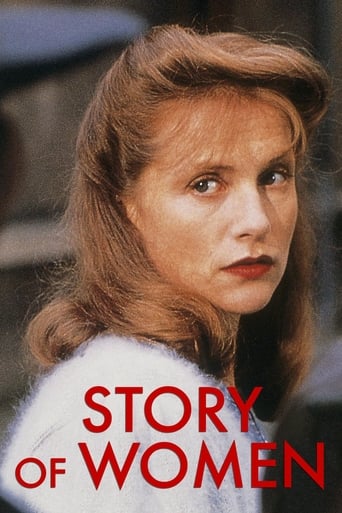climbingivy
This movie that I watched a long time ago, and I just watched a bit of it recently, is a sad portrayal of a selfish female monster.I read on the reviews that she was an uneducated helpless woman who was aborting the little human beings of French women who had been having sex with German soldiers during the German occupation of France during the second world war.This uneducated woman was savvy enough to figure out a way to kill a slew of human beings in their mother's wombs.If she was able to do that it would seem that she could find a real job to support her family.I read on the reviews that her husband was to blame.I think that is utter nonsense.She was responsible for the murders of the babies,not anyone else.I feel sad for the aborted children and her children.It must have been horrible for her children to have to live with the fact that their mother was executed on the horrific machine of death the guillotine.I feel sad that a woman who is a mother would resort to such a heinous way to make money for her family.
Michael Neumann
Isabelle Huppert portrays an uneducated but self-reliant wartime mother of two, who almost ruthlessly assumes the traditional male role of family breadwinner by helping (to use an old euphemism) young girls 'in trouble'. The film isn't exactly impartial in its attitude toward the opposite sex, but don't me misled by the somewhat presumptuous title: it isn't strictly a story for women, and despite the vocation of its heroine has little to say about the volatile issue of abortion. The focus is more on the plight of women as second-class citizens, forced by necessity to fend for themselves (and rely on each other) while their men are away playing soldiers. It tells a complex story very simply, avoiding any soapbox grandstanding but allowing Huppert a chance to invest her character with plenty of gender-specific spleen. The final impact is undeniable: it's an often powerful experience, likely to stir up plenty of talk and emotion.
writers_reign
This is the movie that Mike Leigh ripped off in Vera Drake and it's on view again as part of the Isabelle Huppert season at London's National Film Theatre. The overriding impression is the magnificent central performance from Huppert, definitely one of her best and that's saying a lot; one wonders at the folly of asking Imelda Staunton to go up against Huppert; this is something you just don't do unless you happen to be Nathalie Baye, Catherine Frot or Carole Bouquet and even then you make sure your affairs are in order. Chabrol hits almost every target at which he aims and he aims at a lot, the fact that the film is more or less true - based on the story of the last women to face the guillotine in France - is largely academic. In a nice touch for a tale of a woman who treated abortion casually Huppert's own five year old daughter appears as her fictional offspring. The towering central performance is only one strength of a film that is greater than its parts.
kthnly
I'd like to focus on this film as a French film, not of the United States. If one has seen "La Chagrin et la Pitie," then one knows the legacy of this film. France was not perfect during WWII. Not everyone in France was part of the resistance, mainly, they were trying to survive. I think its an amazing film that sheds light on a crucial point in French history. Yes, it's about abortion and Chabrol does a great job ensuring his abortionist is less than perfect. That's a wonderful point he makes, that no one is perfect, not even the moral majority of the government. But, I come away from this film with the same questions that I get from "Lacombe, Lucien," which are: 'what would I have done?' And, please, don't Monday morning quarterback World War II.



